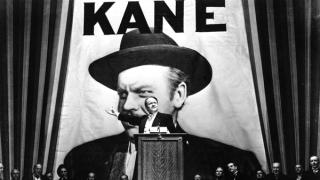Occasionally, a movie continues to speak with insight and clarity to generations well beyond the time of its original release. Such a movie is Citizen Kane, the classic 1941 film which is inextricably linked to the reputation of its director and central player, Orson Welles.
Welles was only 25 years of age and an “enfant terrible” of the American arts when he arrived in Hollywood. His Mercury Theatre in New York had established a formidable reputation for creativity, while his radio play War of the Worlds, based on H.G. Wells’ novel, had earned international coverage for its realism and impact.
Charles Foster Kane, the life of whom is central to the film, is loosely based on publisher William Randolph Hearst, although elements of the film are more likely linked to the life of Colonel Robert McCormick, the Chicago newspaper baron.
Whatever the truth, Hearst tried relentlessly to sabotage the film’s production, release and distribution. He failed and we are left a masterpiece of cinema.
Kane’s life is a lesson in the corruption of prestige and power; the loss of innocence from the Colorado snowfields of his childhood to the cold sterility of his Florida retreat, Xanadu (San Simeon, California).
Megalomania has become a constant in the mogul’s life. All must bend to his will, including his companion Jedediah Leland, superbly played by Welles’ best friend, Joseph Cotton, and who is ultimately dismissed.
Recently the USSC, as part of Aaron Nyerges’ Masters class on the politics of American film, staged a showing of Citizen Kane. A sell-out crowd attended the Chauvel Cinema in Paddington and judging by the response, no one left disappointed. The most frequent question at the end of the film was simply: “when are you having the next film night?”
Kane remains extraordinarily innovative in the cinematic arts, thanks principally to the legendary Gregg Toland. Its long-range focus, oblique angles, use of shadows and flashbacks, will surprise and impress audiences three quarters of a century after its release. The movie won an Academy Award for its screenplay, to the credit of Welles and John Houseman, and while a commercial disappointment, and despite the reservation of the New Republic’s reviewer, it was a resounding critical success.
Released on May 1, 1941, Kane was overtaken by Pearl Harbour six months later and American entry into the War. Over the years it has been revived, with none of its moral clarity having been lost, and its contemporary applications to public life remaining consistent.
Charles Foster Kane would stop at nothing to satisfy his will. Nothing else mattered. Only Kane’s ambitions were worth considering, acting as the driving imperative of all he did.
Audiences can reach their own conclusions about events and figures both distant and all too near.






